

Research centers. Research teams and centers : Europe - North America - Other Publications - Blogs - Organizations and conferences - Mailing lists - Software - Other Here is a list of research groups and departments (and some isolated logics specialists in other departments) in the foundations of mathematics and computer science (logic, set theory, model theory, theoretical computer science, proof theory, programming languages).
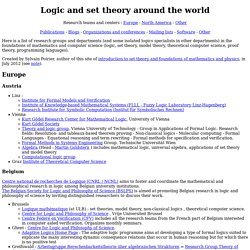
Formal Methods Wiki. Formal methods are mathematical techniques for developing computer-based software and hardware systems.
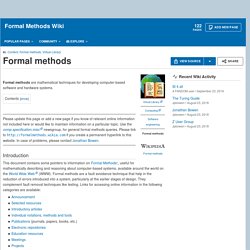
Please update this page or add a new page if you know of relevant online information not included here or would like to maintain information on a particular topic. Use the comp.specification.misc newsgroup, for general formal methods queries. Please link to if you create a permanent hyperlink to this website. In case of problems, please contact Jonathan Bowen. Introduction This document contains some pointers to information on Formal Methods↑, useful for mathematically describing and reasoning about computer-based systems, available around the world on the World Wide Web (WWW). Indicates new entries. indicates a (subjectively!) Selected resources This space will be used to indicate selected new entries and developments in these formal methods pages.
Category:Formal methods. MODNET. MODNET is an FP6 Marie Curie Research Training Network in Model Theory and its Applications, funded by the European Commission under contract number MRTN-CT-2004-512234 (MODNET).
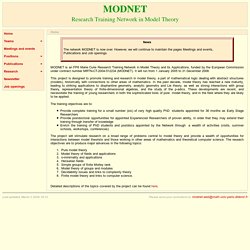
It will run from 1 January 2005 to 31 December 2008. This project is designed to promote training and research in model theory, a part of mathematical logic dealing with abstract structures (models), historically with connections to other areas of mathematics. In the past decade, model theory has reached a new maturity, leading to striking applications to diophantine geometry, analytic geometry and Lie theory, as well as strong interactions with group theory, representation theory of finite-dimensional algebras, and the study of the p-adics.
These developments are recent, and necessitate the training of young researchers in both the sophisticated tools of pure model theory, and in the field where they are likely to be applied. The training objectives are to: MODEL THEORY GROUP. Hegel - getting to know him. Soviet Psychology: Dialectical Logic by Evald Ilyenkov. Calling Bullshit — Syllabus. Logistics Course: INFO 198 / BIOL 106B.
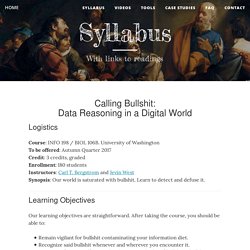
University of Washington To be offered: Autumn Quarter 2017 Credit: 3 credits, graded Enrollment: 180 students Instructors: Carl T. Bergstrom and Jevin West Synopsis: Our world is saturated with bullshit. Learn to detect and defuse it. Learning Objectives Our learning objectives are straightforward. Remain vigilant for bullshit contaminating your information diet. We will be astonished if these skills do not turn out to be among the most useful and most broadly applicable of those that you acquire during the course of your college education. Charles Sanders Peirce. 1.
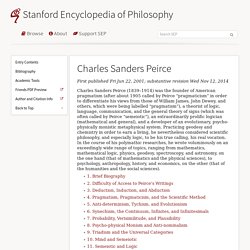
Brief Biography Charles Sanders Peirce was born on September 10, 1839 in Cambridge, Massachusetts, and he died on April 19, 1914 in Milford, Pennsylvania. His writings extend from about 1857 until near his death, a period of approximately 57 years. His published works run to about 12,000 printed pages and his known unpublished manuscripts run to about 80,000 handwritten pages. The topics on which he wrote have an immense range, from mathematics and the physical sciences at one extreme, to economics, psychology, and other social sciences at the other extreme. Peirce's father Benjamin Peirce was Professor of Mathematics at Harvard University and was one of the founders of, and for a while a director of, the U.
Peirce graduated from Harvard in 1859 and received the bachelor of science degree in chemistry in 1863, graduating summa cum laude. From 1879 until 1884, Peirce maintained a second job teaching logic in the Department of Mathematics at Johns Hopkins University. 2. Portal:Logic. From Wikipedia, the free encyclopedia As a formal science, logic investigates and classifies the structure of statements and arguments, both through the study of formal systems of inference and through the study of arguments in natural language.
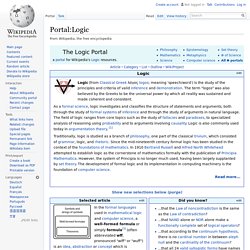
PEITHÔ'S WEB. Index of the Site of the pages of: Ontology. Theory and History. ASL - The Association for Symbolic Logic. Deducción. Razonamiento inductivo. El propósito del razonamiento inductivo o lógica inductiva es el estudio de las pruebas que permiten medir la probabilidad de los argumentos, así como de las reglas para construir argumentos inductivos fuertes.
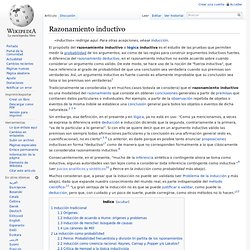
A diferencia del razonamiento deductivo, en el razonamiento inductivo no existe acuerdo sobre cuándo considerar un argumento como válido. De este modo, se hace uso de la noción de "fuerza inductiva", que hace referencia al grado de probabilidad de que una conclusión sea verdadera cuando sus premisas son verdaderas. Así, un argumento inductivo es fuerte cuando es altamente improbable que su conclusión sea falsa si las premisas son verdaderas[1] Tradicionalmente se consideraba (y en muchos casos todavía se considera) que el razonamiento inductivo es una modalidad del razonamiento que consiste en obtener conclusiones generales a partir de premisas que contienen datos particulares o individuales.
Inducción tradicional[editar] Orígenes[editar] 1. 2. 3. 4. 5. Razonamiento abductivo. Aristóteles investigó los razonamientos abductivos en sus Primeros analíticos (II, 25).
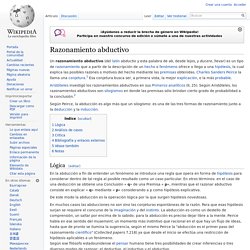
Según Aristóteles, los razonamientos abductivos son silogismos en donde las premisas sólo brindan cierto grado de probabilidad a la conclusión.[2] Según Peirce, la abducción es algo más que un silogismo: es una de las tres formas de razonamiento junto a la deducción y la inducción. Lógica[editar] De este modo la abducción es la operación lógica por la que surgen hipótesis novedosas. C. S. Peirce: "Deducción, inducción e hipótesis" Charles S.
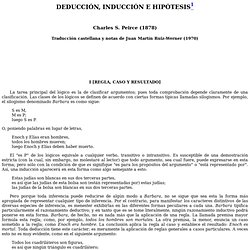
Peirce (1878) Traducción castellana y notas de Juan Martín Ruiz-Werner (1970) La tarea principal del lógico es la de clasificar argumentos; pues toda comprobación depende claramente de una clasificación. Las clases de los lógicos se definen de acuerdo con ciertas formas típicas llamadas silogismos.